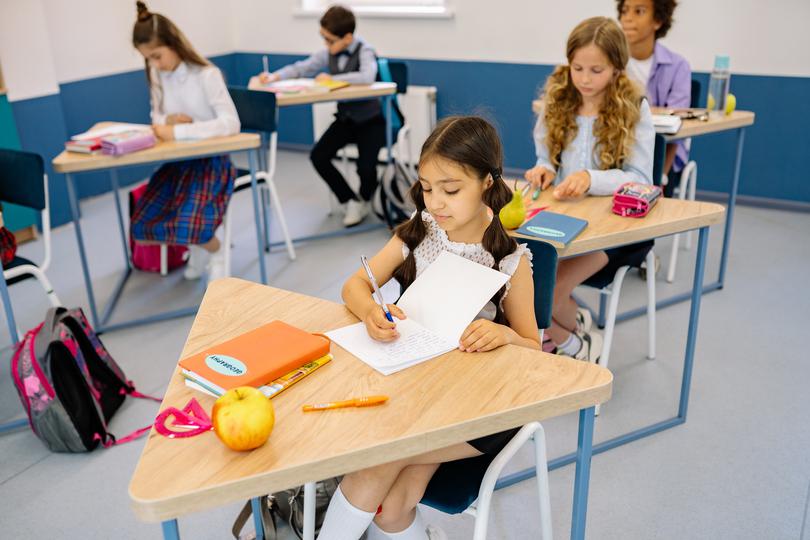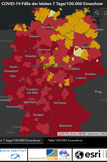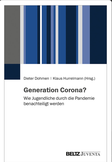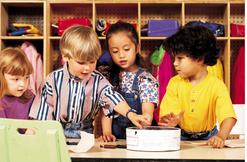How do I find a school place for my child?
Depending on the state and type of school, different things need to be considered
The search for a suitable school place is one of the most pressing concerns for parents and guardians. This is also true - and currently especially so - for families newly arrived in Germany, such as refugees from Ukraine. Almost all of the inquiries we receive as a parent hotline revolve around this question.

The German school system
In Germany, school attendance is compulsory. If your children are older than six years, they must go to school. However, in some federal states, compulsory schooling is currently suspended for children from Ukraine for a few weeks or months. The overview below gives a more detailed overview of the regulations in the individual federal states.
The vast majority of schools in Germany are run by the state. Your children can attend these schools free of charge. In addition, there are private and international schools, for which fees are charged, however, the amount usually depends on the parents income.
Schooling begins with the Primary level, i.e. attendance at elementary school up to the 4th grade (or up to the 6th grade in Berlin and Brandenburg). The purpose of elementary school is to prepare the little ones for learning in the secondary level (secondary school forms).
Except in North Rhine-Westphalia, elementary school children are assigned schools according to their place of residence. In justified cases, it is possible to apply for retraining at the relevant school authority
The primary level is followed by the lower secondary level, which comprises all secondary schools from the 5th grade (in Berlin and Brandenburg from the 7th grade) to the 9th/10th grade. There are very different types of schools in the federal states, which also have very different names: The original core school types were or are the Hauptschule, the Realschule and the Gymnasium. The Gymnasium is for higher-achieving students, while the Hauptschule is for lower-achieving students.
However, as fewer and fewer students went to the Hauptschule, these were merged with the Realschulen in almost all federal states. The name of these "community schools" varies widely: Sekundarschule, Gesamtschule, Mittelschule, Oberschule or Werkrealschule. If the word "integrated" is in front of it, for example "integrated Comprehensive School" or "integrated Secondary school", then it is a school that - like the Gymnasium - leads to the Abitur.
At all of these schools, students in Germany can earn a school-leaving certificate that is important for their further educational path. In principle, three degrees can be earned:
- Secondary school leaving certificate or vocational training certificate
- Realschule or intermediate school leaving certificate (Mittlere Reife)
- Abitur (general university entrance qualification)
Which secondary school your child should attend is not always entirely at your own discretion, but in some states is dictated by a binding teacher recommendation.
Young people who successfully complete the Hauptschule or Realschule or one of the various schools with several courses of education and leave with a Hauptschule or Realschule certificate usually go on to do dual or school-based vocational training, or transfer to a Gymnasium or an integrated comprehensive school or integrated secondary school. At the Gymnasium, students can obtain their Abitur or Fachabitur at the end of grade 12 or 13 by successfully passing an examination. This qualification entitles them to subsequently study at a college or university of applied sciences. However, they can also choose direct entry into practice via vocational training.
In Germany, so-called Welcome Classes are usually set up for children and young people from the war zone in Ukraine, but they can also be called something else. The aim of these Welcome Classes is to teach foreign children and young people in these learning groups their first basic knowledge of the German language, so that the students can then be integrated into the regular classes as quickly as possible. In a refugee class, different nations, different age groups and different levels of education come together. As a rule, the employees of the initial reception centers provide support in applying for a school place.
In the following, we briefly describe the regulations in force in the 16 German states:
Baden-Württemberg
Refugee children are eligible to attend school immediately upon arrival. The country has set up a website to answer the most pressing questions: https://km-bw.de/,Lde/startseite/service/faq-ukrainie-krieg-auf-ukrainisch
Bavaria
In Bavaria, compulsory schooling officially begins three months after arrival, but children are welcome to enroll in schools earlier. The state has compiled important information here:https://www.km.bayern.de/ukraine/informationen-fuer-fluechtlinge.html
Berlin
Parents or guardians must first register their children at the coordination office of the school board in their district of residence. The school authority decides which school and which grade the child will be enrolled in. This takes into account the childs age, a language test and school medical examination. Parents then register their child in person at the notified school. For children who do not yet have German language skills, 250 new welcome classes are planned.
https://www.berlin.de/sen/bjf/gefluechtete/#schule
Brandenburg
In Brandenburg, compulsory education is suspended for the first six weeks after arrival. The Ministry of Education offers voluntary language courses for the first three months at all reception centers.https://mbjs.brandenburg.de/current-ukraine-informationrefugee-schoolchildren.html
Bremen
The school registration of children and adolescents of school age (6-18 years) are made centrally through the Senator for Children and Education. Please send an e-mail to ankommen@bildung.bremen.de with your personal data such as first name, surname, date of birth and current address, as well as telephone number. The colleagues Mrs. Ugrar (general education schools, Tel.: 0421 361 56603, Guelcin.Ugrar@bildung.bremen.de) and Mr. Hallmann (vocational schools, Tel.: 0421 361 12561, Torsten.Hallmann@bildung.bremen.de) are available for information. (also in Russian and Ukrainian)
Hamburg
Newly immigrated children and young people under the age of 16 with little or no knowledge of German are prepared for regular classes in a basic or international preparatory class (IVK). The School Information Center (SIZ) is responsible for the enrollment of the vast majority of children and adolescents under the age of 16. The SIZ checks the officially stated age and assigns them to age-appropriate basic classes or IVK. No personal appointment is required at the SIZ; a copy or a legible photo of the ID or birth certificate (important: age information) and the current address are sufficient. (zuschulung@bsb.hamburg.de)On this there is a linked document in Ukrainian with all relevant information below: https://www.hamburg.de/bsb/ukraine/15967848/zuschulung/
Hesse
The first point of contact - after the registration office - is the reception and roasting centers of the locally responsible state education authority. The state has compiled the contacts of the school offices and further information here: https://kultusministerium.hessen.de/schulsystem/unterstuetzung-fuer-gefluechtete-familien
Mecklenburg-Western Pomerania
As a general rule, all Ukrainian students are admitted to the locally responsible school. Parents or legal guardians contact the locally responsible school and bring their own personal documents (identity card or passport or substitute certificate), confirmation of registration, the childs birth certificate, school reports and proof of health. Depending on whether the child can communicate well in the German language and can read and write, the school management then decides whether he or she can stay at the school or should transfer to a site school with intensive support in the area of "German as a second language" (DaZ).
https://www.regierung-mv.de/Landesregierung/bm/Blickpunkte/Umgang-mit-dem-Ukraine%E2%80%93Krieg-an-den-Schulen/ (only in German)
Lower Saxony
The state has compiled the most important information here: https://www.mk.niedersachsen.de/startseite/aktuelles/krieg_gegen_die_ukraine_angebote_und_unterstutzung_in_kitas_und_schulen_faqs/faqs_fur_eltern_aus_der_ukraine_allgemein_bildende_schulen/faqs-fur-eltern-aus-der-ukraine-allgemein-bildende-schulen-209709.html(largely in Ukrainian)
School in Lower Saxony concise and clear: https://www.mk.niedersachsen.de/download/182382/Schule_in_Niedersachsen_knapp_und_klar_ukrainisch.pdf
North Rhine-Westphalia
The allocation of a school place for school-age children and adolescents is carried out by the locally responsible state education authorities. As part of the allocation process, advice is also given to incoming families from Ukraine on the appropriate schooling of their children. WDR has compiled a very comprehensive overview with information that is updated regularly: https://www1.wdr.de/nachrichten/fluechtlinge/ukraine-deutschland-informationen-ueberblick-102.html
General information on the school system in North Rhine-Westphalia (NRW) can be found here: https://www.bra.nrw.de/bildung-schule/landesstelle-schulische-integration/schulische-integration-von-kindern-und-jugendlichen-aus-der-ukraine The information is available as a PDF in German, English, Ukrainian and Russian (scroll down a little, see "Information on the school system in North Rhine-Westphalia").
Rhineland-Palatinate
From the moment they are assigned to a municipality, children and young people are required to attend school. The state government has compiled frequent questions here: https://ukraine.rlp.de/de/kita-und-schule-shkola-ta-ditjachii-sad/schule/ Information on the school system in Rhineland-Palatinate can be found on this page: https://migration.bildung-rp.de/fileadmin/user_upload/migration.bildung-rp.de/Broschueren__Lehrplaene/Das_SchulsystemRLP_Ukrainisch_.pdf
Saarland
Compulsory schooling for refugee children and young people also applies in the Saarland. The state has compiled the most important questions about the school system here:https://www.saarland.de/DE/portale/ukraine/faq/bildung/faqukrainisch/faqukrainisch_node.html
Saxony-Anhalt
The country forms arrival classes in which instruction is given in German and Ukrainian. To register at the school, a certificate of registration and current proof of a medical examination performed in Germany are required. https://mb.sachsen-anhalt.de/themen/schule-und-unterricht/informationen-fuer-eltern-und-lehrkraefte-aus-der-ukraine/
Saxony
The State Office for Schools and Education is the central contact for parents from Ukraine seeking help. School registration is done electronically via a registration portal: https://www.lasub.smk.sachsen.de/gefluechtete-kinder-aus-der-ukraine-sind-willkommen-4490.html
Schleswig-Holstein
In this state, registration is done directly through the school where the child is to be enrolled. https://www.schleswig-holstein.de/DE/Fachinhalte/S/schule_fluechtlinge/schulbesuch_ukraine.html
Thuringia
The Education Authority of the State of Thuringia recommends that parents contact a local school directly within three months of moving in. The following documents should be brought to an appointment at the local school: translated school reports, the current registration certificate/residence permit, proof of vaccinations.https://schulamt.thueringen.de/aktuell/informationen-fuer-ukraine-fluechtlinge
Published on
Topics
Articles on the topic
-
Childcare - how does it work in Germany?
The path from application to daycare place is simple and complicated at...

-
Controversy: open schools or close schools?
Politicians should react now to slide unprepared into a forced closure....

-
Corona pandemic severely disadvantages children and young people - but there is no "Corona generation"
This is a core finding of the anthology "Generation Corona? How young...

-
What to do after the Easter holidays? - Part 2: Final exams
An overview of the regulatory diversity

-
Kitas and schools in a state of flux
Update from 9.4.2021 on the current regulations

-
What happens after the Easter holidays?
Part 1 - Kitas and schools: open or closed?
